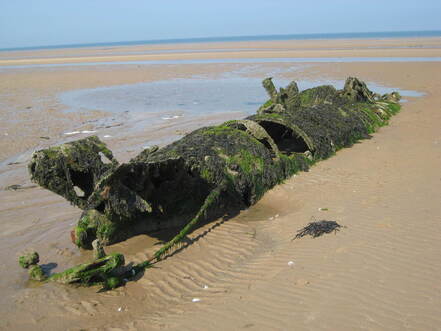Underwater Heritage
|
‘X Craft’ Midget Submarines, Firth of Forth. The fragmented remains of two mini submarines lie on a sandbar off the coast of East Lothian. These hulls were developed early in the Second World War but were later sunk as targets. © Roger Curtis
|
The Blue Shield Underwater Heritage Working Group is focused on the impact of natural disasters and human conflict on underwater cultural heritage, both in the UK and internationally. The Working Group aims to establish relations between underwater heritage practitioners, the military, and other institutions with an interest in this heritage. The Group is specifically looking at:
|
MEMBERS
Elena Perez-Alvaro - CHAIRBio
Dr Elena Perez-Alvaro is a Lecturer at the Master of Cultural and Natural Heritage Management at UNIR University, Spain, and a Research Associate at Nelson Mandela University, South Africa. She is also an Expert Member of the ICOMOS International Committee on the Underwater Cultural Heritage, Expert Member of the ICOMOS International Committee on Intangible Cultural Heritage, and part of the ICOMOS Sustainable Development Goals Working Group. She is also Chair of the Underwater Heritage Working Group of UK Blue Shield. Her main research is a holistic multidisciplinary study creating links between aspects of heritage, identity, and society, the past, and the future. She is the author of several articles in specialised journals and books in diverse fields. She has also published with Routledge the monography Underwater Cultural Heritage: Ethical Concepts and Practical Challenges. |
Hayley RobertsBio
Hayley Roberts is a public international lawyer with a specialisation in the law of the sea, and is particularly interested in underwater cultural heritage and the marine environment. She is a member of the Blue Shield Underwater Cultural Heritage Working Group. Hayley has been a member of UK Blue Shield since 2023. Hayley is also Reader in Public International Law at Bangor University, Vice-Chair of the Board of Commissioners to the Royal Commission on Ancient and Historical Monuments of Wales, and sits on the UK National Decade Committee for the UN Decade of Ocean Science for Sustainable Development (FCDO/Defra). Hayley also sits of the Law Council of Wales and serves on the Editorial Board of Ocean Development and International Law. Hayley has over 16 years’ experience researching underwater heritage and the law. She has published in leading academic journals and won competitive grant funding to further research on marine cultural heritage, law and policy. She is currently authoring a monograph on State-owned Shipwrecks and International Law. |
David RobertsBio
David Roberts has always had an interest within the fields of architecture including its significance and development during different phases of history that provides a rich heritage around the world. Currently runs an architectural practice in Somerset dealing with traditional and historic buildings. This has resulted in his interest with Blue Shield UK being also from a military background. Dave is a member of SPAB and the Traditional Architecture Group within RIBA. Involved in architecture since 1987. Further studies continued at the University of Cambridge in Historic Building Conservation, and the University of Oxford in Architectural History, Condition Surveys of Historic Buildings, and Heritage Values and the Assessment of Significance. At present, further Postgraduate courses are being carried out at Oxford in Architectural History. Including architecture, Dave has served in the Royal Navy both full time and part time operating in sea, air, and land environments within the Commando Helicopter Force from 1989 to current where he is now a reservist. Operated in Northern Norway, North Atlantic, Mediterranean, Caribbean, Balkans during the 1990s, and the deserts of Iraq, Afghanistan, and Jordan |
Tom PinfoldBIO
Tom Pinfold is a serving Royal Navy officer specialising in strategic communications. He is part of the Royal Navy's Human Security cadre and the lead for Cultural Property Protection. Tom read Archaeology at UCL (1998-2001), before working as a rare books archivist, and a field archaeologist in the UK. He also appeared in two hit BBC history programmes as an experimental archaeologist and TV presenter, before becoming a Royal Navy officer working in the UK and overseas. He has extensively volunteered in the military museum sector in London and Chester, the conservation department of the Society of Antiquaries in London, and been with Blue Shield UK since 2019. He has Masters Degrees in Terrorism, Security and Society from KCL (2010), and Military History from the University of Chester (2012), and a PhD in Art and Antiquities Crime focused on the Mediterranean region, from Staffordshire University. |
|
|




